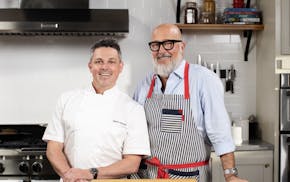It takes a lot of fuel to power a winning team.
Thermoses of bone broth to stave off the late-night munchies. Protein balls for quick bites, and oranges for recovery. Sweets that satisfy but still keep sugar in check.
That's all on the menu for the likes of Naz Reid, Rudy Gobert and Anthony Edwards.
The Timberwolves, and other elite Minnesota athletes, get their fuel from KZ Provisioning. The company, founded by two chefs, Minneapolis restaurateur Gavin Kaysen and food TV host Andrew Zimmern, crafts every meal and snack with performance in mind, from training to playoffs.
Back in 2017, Kaysen was visiting friends on the Minnesota Wild during one of their meal breaks. The chef and owner of Spoon and Stable and other top Minneapolis restaurants was "really taken aback by their diet."
"They were consuming fish sticks on a Tuesday and burritos on a Wednesday, and it was just sort of this mind-numbing moment that I'm like, all of this payroll and yet they're not focused on what it is they're putting inside of their bodies," he said.
As a chef, but also as a parent to young children who play sports, food and nutrition was something Kaysen thought about all the time. Why shouldn't the menus for Minnesota's elite athletes get the same attention?
Kaysen took the idea to his friend Zimmern.
"We tinkered with a business plan and two weeks later, we had a meeting with the general manager of the Wild at the time and signed a deal with them," Kaysen said.
Gradually, their business, KZ Provisioning (K is for Kaysen, Z is for Zimmern), added more teams to its roster, including the Minnesota Lynx and the Timberwolves, which are currently in the middle of the Western Conference finals.
What started as an observation has evolved into a comprehensive program that goes far beyond standard team catering. "We don't drop off food and throw it into a steam table," Zimmern said. "We have a hospitality manager embedded with the team. We have our cooks and chefs embedded with the team. We are actually there every single day in the practice facilities and on game day."
Chef and partner Ryan Stechschulte oversees the day-to-day culinary logistics, and the food team adapts individual menus in consultation with team nutritionists, strength coaches and the athletes themselves.
A young basketball star like Edwards might have different needs than veteran players managing different metabolic requirements. Where the players come from also influences their food preferences. And, they've learned, hockey players eat completely differently from basketball players.
"Post-practice meals, the amount of calories that a hockey player can take down, a larger defenseman, is incredible," Zimmern said.
It surprises Kaysen and Zimmern that their tailored approach hasn't caught on more widely in professional sports.
"There are a lot of teams that are still fed by large food service companies," Zimmern said. Others are fed by private chefs that have been with the teams for generations.
Coming from the restaurant world, Zimmern says what they offer is different: It's not just food, it's hospitality.
"When on the road, a player needs to focus on their craft, their profession. It's a business. They are away, and they may miss a 5-year-old kid's birthday, or an anniversary with a spouse, or an athlete who used to play for us may come into the building and have just had a 4,000th goal or a 400th game in the NBA, and we celebrate those things with them," Zimmern said. "We take care of recognizing those things with food baskets, or there may be a cake delivered to a family while a player is away. We take the hospitality component of this very seriously."
Like many Minnesotans, Zimmern and Kaysen will be watching Saturday as the Wolves return to Target Center to continue their quest for a Western Conference championship. And Kaysen will be watching on TV like most everyone else.
"I'm not allowed to go to the games right now because they've won every one since I haven't gone," he said. "I'm too superstitious."
No matter, Kaysen said. "It feels really freaking cool to watch these guys do what they do on TV, and know that we have the smallest percentage of being a part of it."

How do you paint a giant spoon? At the Minneapolis Sculpture Garden, very carefully.

Semisonic cancels Minnesota Yacht Club and other summer gigs with bassist still on the mend

Meet the chefs feeding the Wolves and other Minnesota elite athletes

Wayzata's Mexican fine-dining escape getting a new look and a new menu

